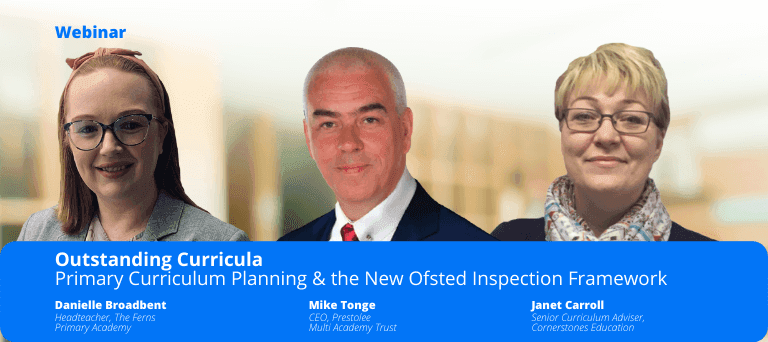Outstanding Curricula: Key insights from our webinar
Andrew King
10
min read
Earlier in December, we hosted our Outstanding Curricula webinar in collaboration with Cornerstones Education. Hosted by Helen Woodward (Zen Advisor and former Head of School Improvement at the Department for Education), the purpose of the event was to provide school leaders with insight and best practice in curriculum planning which enables children to reach their potential and which also meets Ofsted requirements.
We were lucky enough to be joined by an expert panel:
Danielle Broadbent (Headteacher at The Ferns Academy in Bolton)
Mike Tonge (CEO, Prestolee Multi Academy Trust)
Janet Carroll (Schools Consultant, Cornerstones Education)
You can find the hour-long webinar in full at the bottom of this page, but here is a summary of just a few of the points made by our panel:
The new Ofsted framework
"You see a lot of children who experience a curriculum, but don't remember it in learning." – Mike Tonge
Mike began by addressing the extent to which the pandemic has impacted on schools and the case for continuing Ofsted inspections:
‘Before anybody says there's been a global pandemic, I know there's been a global pandemic and Ofsted know there's been a global pandemic. But we also know that the national curriculum has been around since 2014, so it should be in place and it should be running. There should be some narrative around how the pandemic has hit that.’
Mike explained Ofsted are aware of how the pandemic has affected schools, and that they are still interested to see evidence of learning:
‘You hear schools talk about, you know, ‘as a school, our aim is pathways to the future’. What does that actually mean?! How does that impact on curriculum design? (...) And Ofsted rightly come in at this point and say ‘have you really thought about this?’ (...) Learning is defined as an alteration in long term memory. If nothing has been altered, then nothing has been learned. And you see a lot of children who experience a curriculum, but don't remember it in learning’
To find out whether learning – rather than just a guideline-meeting curriculum – is taking place, Ofsted talk directly with pupils:
‘[Ofsted] will go into some classes and see whether the planned curriculum is being taught, and they’ll go into some books and see if the planned curriculum is being delivered. But you can't tell whether it's been learnt by going into a lesson or looking at a book. So actually, let's ask some children if the things you say they should know, and remember, they actually do know and remember at this point. But if not, then let's have another conversation and see what we're doing about it. And that's the process of judging the quality of education in a nutshell.’
Getting the call from Ofsted
"To make staff feel really empowered through the inspection, it was really important that they knew what was going on, and that nothing was hidden." – Danielle Broadbent
Danielle detailed the recent experience of her school being inspected, beginning with her plan of action upon receiving the initial call:
‘Weirdly enough, while I was sitting on a course that was called ‘Preparing for Ofsted’, [the call] came through at around 10:30am. That initial telephone conversation lasted for about an hour and 15 minutes, and it was very much based on intent. What the Ofsted inspector wanted to know was what was the intent of our curriculum, and there was a little bit about context; where we thought we had made improvements since our last Ofsted inspection (...) They genuinely wanted to know: what is your academy, and what is your school doing to prepare children for the next stage in their education or the next stage in their lives?’
The school were well prepared for receiving this call, as Danielle and her Senior Leadership Team had a comms protocol in place:
‘Myself and the Executive Head sat together, with the phone on loudspeaker, and really worked together. While one person was answering a question, the other person was triangulating information from our curriculum document, our curriculum position statement, and from the handbook. And we were really picking out things that we knew we wanted to lead the inspector towards in their lines of inquiry on day two.’
Danielle then explained how she prepared a briefing for the school straight after the phone call:
‘As soon as the Ofsted call was answered, we already had a plan of who was speaking to the inspector. At the same time, we had teams of people that were already preparing while we were on that phone call, making sure that all the portals were open and the parent questionnaires were going out, and that the timetable was ready. (...) We are all leaders, whether that’s a leader of the classroom or the leader of a subject. To make staff feel really empowered through the inspection, it was really important that they knew what was going on, and that nothing was hidden.’
All hands on deck
"I don't think you'll ever have an outstanding curriculum if your leaders are not passionate about curriculum." – Janet Carroll
Janet emphasised the importance of every single school leader being active in refining a school’s curriculum:
‘I don't think you'll ever have an outstanding curriculum if your Headteacher, or your leaders, are not passionate about curriculum and are actively involved. I’ve worked with thousands of schools over the years with Cornerstones now, and it still shocks me when I first talk to schools about considering using us to support their curriculum delivery, and Headteachers aren’t involved. (...) One of my saddest experiences of the previous Ofsted inspection framework is when the lead inspector – when we tried to work in our passion about the curriculum, how important we thought it was – actually said ‘the curriculum is neither here nor there.’
She went on to describe how that quote from an inspector is testament to the way in which the newest Ofsted framework has moved toward a stronger emphasis on curriculum:
‘I think it's shifted massively, and now curriculum is at the centre of the framework. But I think if you'd have asked me again what I thought an outstanding curriculum was when I was teaching, it’s about being engaging, about being child-led, it’s about enquiry. And I still think they have a massive part to play in creating an outstanding curriculum.’
Janet was keen to stress that while written intent is important, inspectors will always be beyond intent and into practice:
‘You can have the most incredible intent written, but if it's not delivered and can't go and talk to children about it [then intent isn’t enough]. I've just read an Ofsted report from an Outstanding school that's unfortunately gone in the wrong direction, because despite fantastic intent documents, their teachers didn't have the subject knowledge to back that up.’
To learn more about Cornerstones Education could help to build your school’s curriculum, click here.
How to build an effective primary curriculum framework
How to design, plan and teach an ambitious primary curriculum
Follow Cornerstones on Twitter
Follow Mike on Twitter
Follow Danielle on Twitter
Follow Zen Educate on Twitter
Listen to Zen Educate’s 10 with Zen podcast
We’d like to thank Janet, Mike and Danielle for taking part in this webinar. You can watch the hour long webinar in full below.
Search blog posts …
Search







